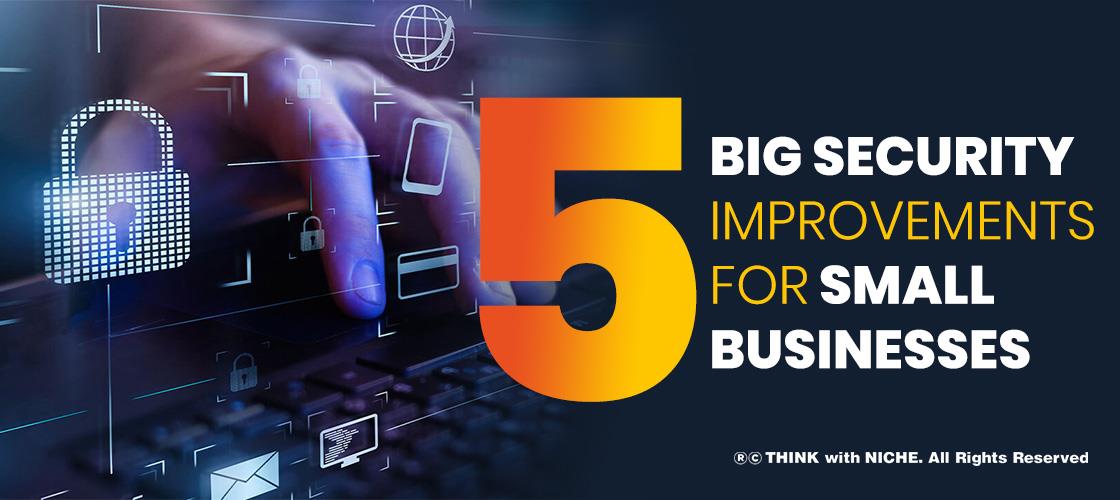
Post Highlights
Large businesses aren't the only ones who need to be concerned about cybersecurity.While small businesses may not be as enticing to criminals, they stand to lose more if their information is exposed.In light of this risk, a small firm's security is essential. #ThinkWithNiche
Small enterprises were the target of 43% of cyberattacks in 2019. Worryingly, the average cost of these attacks is $200,000, with 60% of victims closing their doors within six months of the strike. Smaller companies must improve their cybersecurity, but many are unwilling to do so due to the high costs. While high-end security solutions can be costly, a variety of low-cost options can have a significant impact on security. This issue has five small business solutions.
- Employee Training- A strong firewall is the most important, yet least expensive, small business security enhancement. Staff training on optimal security practices costs nothing except time, yet it is a crucial first step. Because a security system's efficacy is directly proportional to how well its users understand how to utilise it, all workers must understand how to stay secure. According to one report, poor use of IT resources damaged 50% of SMBs in 2019. Employees endanger themselves and the firm by not using strong passwords or keeping away from public Wi-Fi. Comprehensive training can help you avoid these potentially dangerous blunders.
- Prevent users from obtaining excessive amounts of information- Even if you teach your employees, you cannot rely on them to execute safely. Employee dissatisfaction or, more often than not, apathy represents a serious threat to an organisation from the inside. Small businesses can protect themselves from such attacks by limiting employee access to specific files and systems. User access restrictions can also help to contain a cyberattack. Bring your own device (BYOD) policies that demand multi-factor authentication and network segmentation will limit user access while saving money for the company. Many of these constraints may be implemented by companies utilising built-in technology, requiring IT teams to spend very little money at this point.
- Vulnerabilities in RDP Should Be Removed- Small business security solutions can address remote desktop protocol (RDP) vulnerabilities at a low cost. RDP attacks are the most common kind of ransomware attack on small businesses, yet they are frequently disregarded. Fortunately, they are simple and affordable to repair. The easiest approach to defend against RDP attacks is to first check to see if RDP is enabled on your system, and then deactivate it if necessary. Even if new software is required, it is typically not excessively expensive and may be completed with only basic technical knowledge.
- Protect and safeguard your data by encrypting it- Reliable cybersecurity takes precautions to ensure that, in the case of a breach, the effects are as minimal as possible. Small businesses can achieve this through encryption and backups, for example. In the event of a breach, encryption renders data practically useless for hackers, while backups ensure that mission-critical data and systems remain available and operational. Many modern gadgets have built-in encryption, which may be less reliable than dedicated encryption software. Nonetheless, these services, as well as backup storage alternatives in the cloud and on physical media, are usually affordable.
- Enable software upgrading automatically- Using out-of-date software is one of the most common and serious risks that businesses face. Up to 55% of all programmes in use today are out-of-date, leaving them vulnerable to attacks that updates might prevent. Regardless of how widespread this issue is, resolving it is straightforward and free. Companies just need to enable automatic software and device upgrades to avoid these risks. Although this may appear to be a minor step, it ensures that all apps have the most up-to-date safeguards, safeguarding them against new vulnerabilities as they are identified.
It Is Critical To Protest A Small Business
On the surface, small businesses appear to be less appealing to hackers, but their total lack of security infrastructure makes them a target.Small business security must improve in light of these new threats, and doing so does not have to be costly. Small businesses may use these low-cost security solutions to battle the growing number of cyber threats. Without spending a lot of money, small businesses can protect themselves from hackers by taking these steps. Many modern devices have encryption.
Comments
Post a Comment